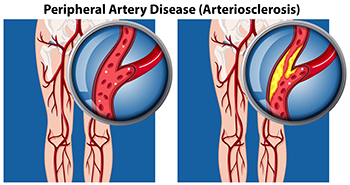NJ (908) 688-5577
NY (212) 737-2528

About 6.5 million people in the United States over the age of 40 have peripheral artery disease (PAD). It is a blockage in the arteries that supply blood to the extremities, but the condition is more common in the feet and lower limbs. Risk factors for peripheral artery disease include smoking, high blood pressure, diabetes, atherosclerosis, and high cholesterol. People over 60 are at further risk. The most common symptom of PAD is pain in the legs while active, but that subsides after resting. Sores in the legs or feet that don’t heal and cold or numb toes are other symptoms as well. If you believe you may have PAD, please consult a podiatrist for an examination and testing.
Peripheral artery disease can pose a serious risk to your health. It can increase the risk of stroke and heart attack. If you have symptoms of peripheral artery disease, consult with Glenn Davison, DPM from Advanced Podiatry. Our doctor will assess your condition and provide you with quality foot and ankle treatment.
Peripheral artery disease (PAD) is when arteries are constricted due to plaque (fatty deposits) build-up. This results in less blood flow to the legs and other extremities. The main cause of PAD is atherosclerosis, in which plaque builds up in the arteries.
Symptoms
Symptoms of PAD include:
It is important to note that a majority of individuals never show any symptoms of PAD.
Diagnosis
While PAD occurs in the legs and arteries, Podiatrists can diagnose PAD. Podiatrists utilize a test called an ankle-brachial index (ABI). An ABI test compares blood pressure in your arm to you ankle to see if any abnormality occurs. Ultrasound and imaging devices may also be used.
Treatment
Fortunately, lifestyle changes such as maintaining a healthy diet, exercising, managing cholesterol and blood sugar levels, and quitting smoking, can all treat PAD. Medications that prevent clots from occurring can be prescribed. Finally, in some cases, surgery may be recommended.
If you have any questions, please feel free to contact our offices located in Union, NJ and New York . We offer the newest diagnostic and treatment technologies for all your foot care needs.